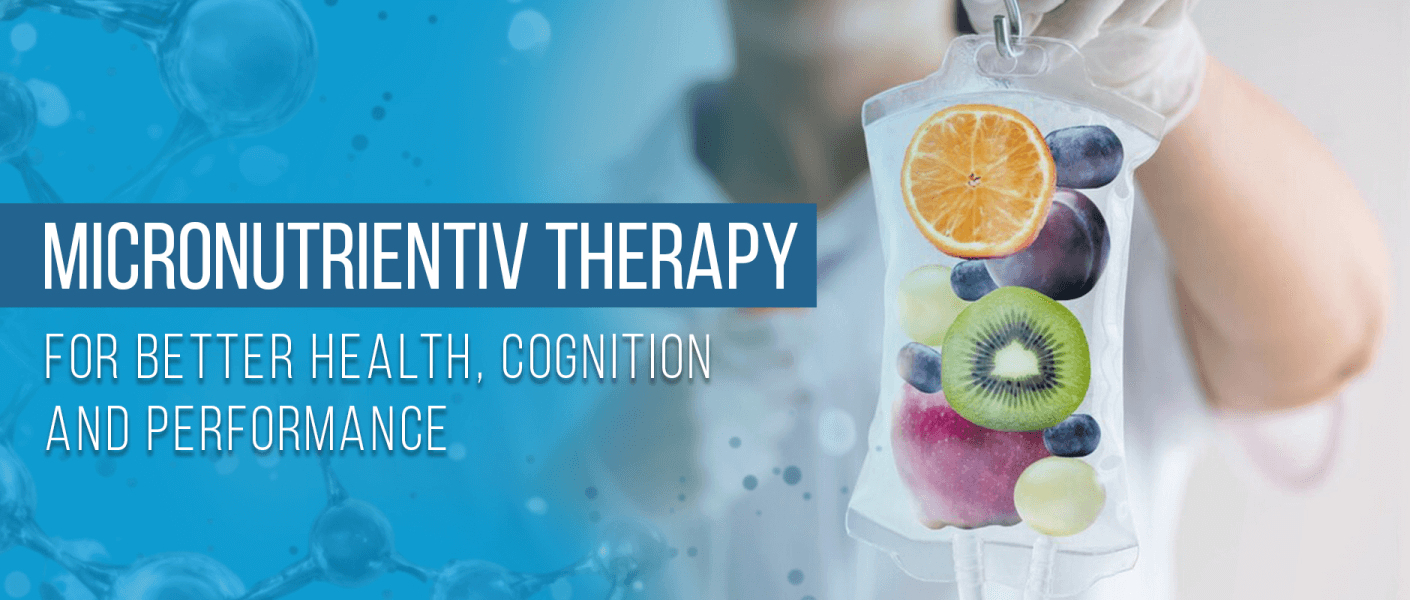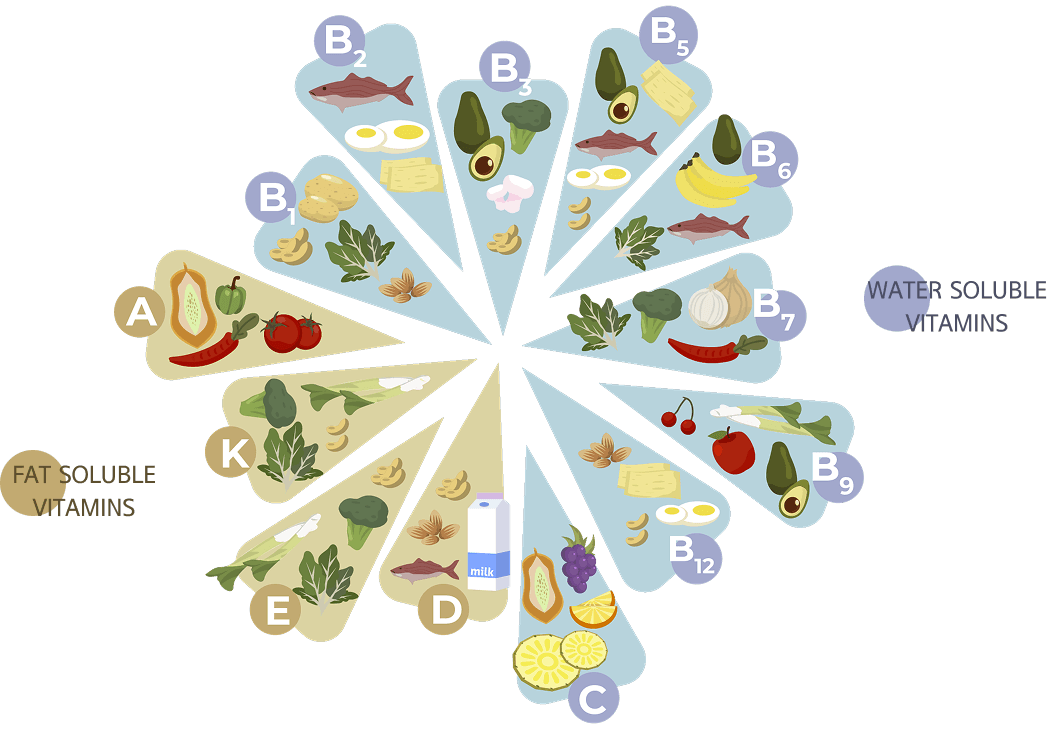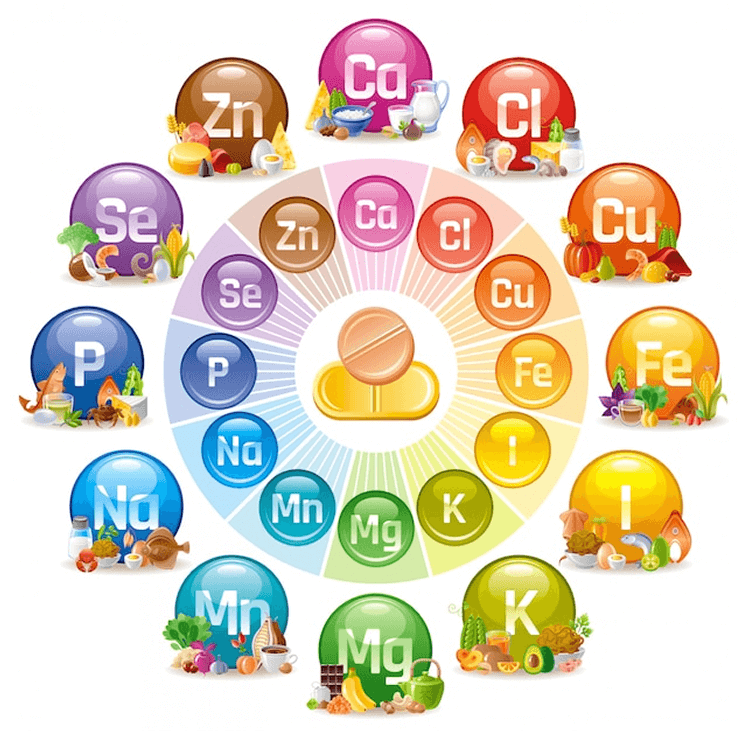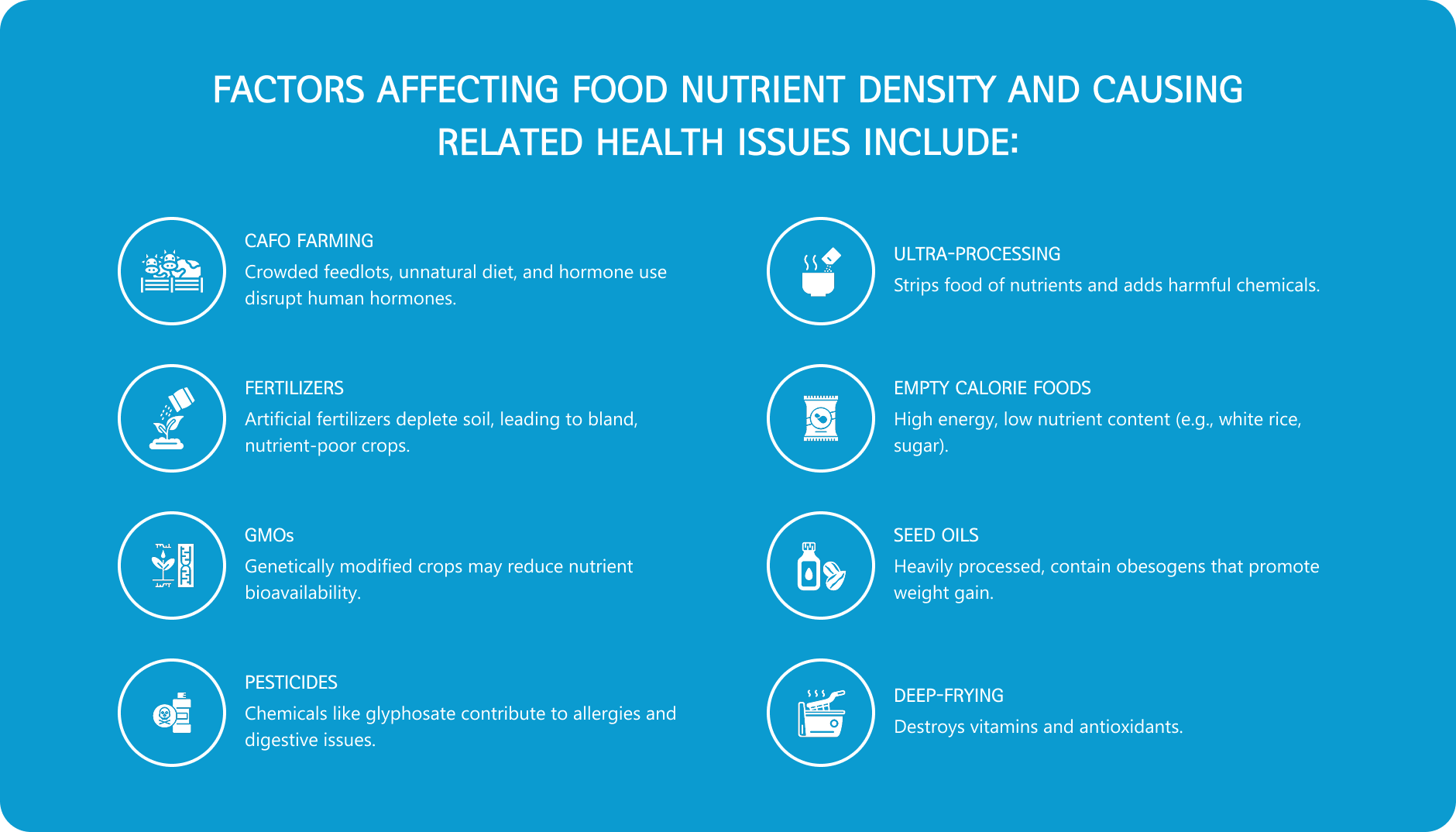
Micronutrients are essential vitamins and minerals that our bodies need in small amounts to maintain the myriad of biological processes that constitute good health. Your body needs both vitamins and minerals to grow, develop and function.
Vitamins
Vitamins are organic compounds, meaning they come from living organisms like plants and contain carbon-hydrogen (C-H) bonds. Vitamins can be subcategorized as water-soluble and fat-soluble. Water-soluble vitamins are the B-complex vitamins and vitamin C. They dissolve in water and are not stored in large amounts in the body. Whatever amounts your cells don’t use are gradually flushed out of your system, so they continually need to be replenished.
Of the water soluble vitamins, B3 and B12 are particularly important. B3 – aka niacin or niacinamide – is a precursor to NAD+, an essential co-enzyme found in every cell. NAD+ deficiency can lead to poor mitochondrial function and premature aging. B12 is responsible for red blood cell formation and maintaining the myelin sheath of nerves. Both B3 and B12 are primarily found in animal products like meat, eggs and dairy.
Fat soluble vitamins – A, D, E, and K – can be stored in the body’s fatty tissues and liver, and drawn upon when a demand arises. Your body makes vitamin D3 when your bare skin is exposed to sunlight. Despite the ample availability of sunlight, vitamin D deficiency is common. It can lead to weakened bones, mood disorders and reduced immune function. Fat soluble vitamins are found in abundance in wild caught fish, animal fats, aged cheese, nuts, and oils like olive and avocado.

Minerals
Minerals are inorganic elements that occur naturally in the earth. They find their way into the food chain through plants and the animals who eat plants. Minerals are needed in varying amounts in the body, and can be subcategorized based on the amount you need.
Macro minerals are needed in relatively large amounts for everyday metabolic processes. They include:
- Calcium
- Phosphorus
- Magnesium
- Sodium
- Potassium
- Chloride
- Sulfur
Trace minerals are also essential, but needed in much smaller amounts. They include:
- Iron
- Zinc
- Copper
- Manganese
- Iodine
- Selenium
- Molybdenum
- Chromium
- Fluoride
- Cobalt (as part of Vitamin B12)

Role of Micronutrients in Human Health
Micronutrients are essential to human health, and severe deficiencies can cause serious health disorders, ranging from brittle bones to skin conditions, to hair loss and more. Micronutrients support metabolism, promote brain and central nervous system function, and play a critical role in physical performance.
Metabolic health
Metabolic health relies on efficient energy production, balanced blood sugar levels, low inflammation, and adequate nutrition. Micronutrients play a key role by regulating and supporting biological processes, such as energy production, glucose metabolism, insulin sensitivity, and cellular function. Vitamin B3, a precursor to NAD+, is critical for mitochondrial support, energy production, and DNA repair and synthesis. Micronutrients help to combat inflammation and oxidative stress that are key factors in metabolic disorders.
Cognitive function
Micronutrients are involved in everything from neurotransmitter synthesis to energy metabolism in the brain. The B-Complex vitamins are especially important for brain health. For instance, B-12 deficiency has been linked to cognitive decline in older adults, and deficiency of B3 – an NAD+ precursor – is linked to accelerated aging. Iron is critical for oxygen transport to the brain and for synthesizing neurotransmitters like dopamine, and Zinc supports synaptic plasticity, helping neurons to adapt and form memories in the hippocampus, Magnesium is vital for learning and memory, and for regulating neural excitability.
Physical performance
Micronutrients directly impact physical performance by supporting energy production, muscle function, and tissue repair and recovery. For example, in addition to supporting bone health, vitamin D binds to muscle receptors, boosting protein synthesis and calcium uptake for muscle contraction. Iron is critical to oxygen delivery, and magnesium governs muscle recruitment. Low magnesium can cause cramps, weakness, and slower recovery. The B-Complex vitamins play a key role in converting food into fuel.
Why Our Food Supply is Nutrient-Depleted
In ideal circumstances, you could satisfy all of your body’s micronutrient requirements by eating ample amounts of fresh fruits, vegetables and naturally-fed animal proteins. But technology and innovation, driven by corporate profit motives, have automated and short-circuited food production in ways that deplete nutrient density and contaminate our food supply.
Factors affecting food nutrient density and causing related health issues include:
- CAFO farming, where livestock is confined in crowded feedlots and fed corn and soy instead of their natural diet of grass and other forage plants. The animals are often pumped full of growth hormones to accelerate maturity. Those hormones can make their way into the human organism, disrupting your hormonal balance and creating undesirable side effects.
- Fertilizers are worked into depleted soil to accelerate the growth of plants, for faster crop turnover. The result is often watery fruits and vegetables with bland flavor and low nutrient content.
- GMOs – genetically modified organisms – come from seeds that have been genetically modified to make them more pest-resistant and resilient, but GMO foods are fundamentally altered in ways that can make nutrients less bioavailable to humans.
- Pesticides like glyphosate have been linked to food allergies, digestive disorders, and even cancer. Look for organic produce that has not been sprayed with chemicals.
- Ultra-processing dramatically transforms foods from their natural state, often reducing nutrient density and involving chemical processes and additives that are harmful to human health.
- Empty calorie foods like pasta, white rice and sugary foods have high energy value but are nutrient-scarce.
- Seed oils like canola and soy go through multiple stages of extreme chemical processing to remove odors and flavors before being bottled and sold, stripping them of nutrient value and introducing obesogens that cause weight gain.
- Deep-frying leeches water soluble vitamins and antioxidants from food.

How to Meet Your Micronutrient Needs
In the 21st Century, getting all your vital nutrients from diet alone can be a challenge. You can optimize your diet’s nutrient density by sticking to organic fruits and vegetables, free-range poultry, wild-caught fish, and pasture-raised livestock. Avoid high-carb “filler” foods that are low in nutrients and high in calories – you won’t have room for nutrient-dense alternatives!
Nutritional supplements in the form of pills, capsules and powders can help to bridge the micronutrient gap. Look for organic or natural products from reputable retailers. Cold-press juicing of organic fruits and vegetables can provide a nutrient-dense cocktail, especially when blended with animal-based protein powder. If you are vegan or vegetarian, supplementing with B-vitamins, especially B-12, is crucial.
Advantages of IV Vitamin Therapy
Oral supplements can have their downsides. Some people have a hard time swallowing pills, and many supplements can give you an upset stomach. Hard pills do not always break down well during digestion, and they may even pass right through your system intact. Also, some of the potency of supplements can be lost during digestion, with only a fraction being absorbed and delivered to your cells. And supplements can be inconvenient – you may forget to take pills and capsules altogether, and powders need to be blended, taking time and creating dirty dishes.


For health-conscious people on the go, micronutrient IV therapy provides a convenient and efficient way to replenish micronutrients without pills and powders. Micronutrient cocktails can be custom-blended to provide specific nutrients, like D3, NAD+ and B-12, that tend to be deficient in Western diets. The nutrients go directly into your circulatory system, bypassing your digestive tract and retaining their full potency, to quickly replenish nutrient-depleted cells.
Get Micronutrient IV Therapy in NYC
Busy New Yorkers are constantly on the go, and eating a healthy diet is often not an option. To meet your micronutrient needs, Inviata Wellness offers a broad range of supplements for injection and infusion. In addition, we offer multiple services like cryotherapy, hyperbaric oxygen therapy and more, to optimize health, beauty and longevity.
Whether you want to boost your energy, recover from sports, fortify your immune system or just look and feel great, Invita has you covered. Contact Invita Wellness today, and give yourself the gift of wellbeing, so you can live your life to its fullest.
Get Micronutrient IV Therapy in NYC
contact InVita Wellness today
Book Now
456 Broadway 2 Floor, New York, NY 10013, USA